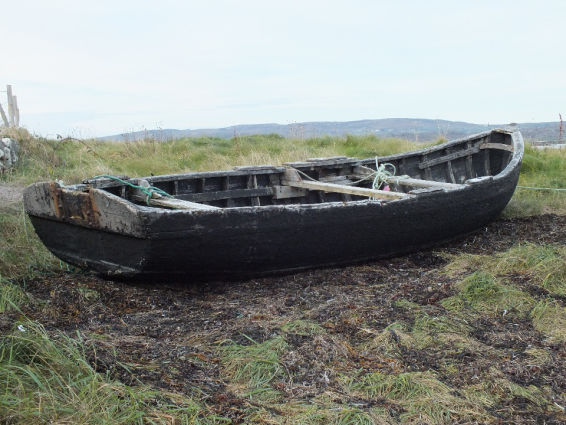Audrey Magee
https://www.irishcentral.com/travel/surprises-about-living-in-ireland
The photo above is of the island of Arranmore and the image of a boy looking out to sea encapsulates Magee’s sensitive, and realistic portrayal of life for a few families living a traditional existence on an Irish island during 1970s. The boy is a young lad who hates his school on the mainland, but yearns for something beyond his loving family. His mother, grandmother and great grandmother all play a huge role in his life.
The story begins in the summer of 1979 with an English artist Mr. Lloyd climbing down into a small boat called a curragh. Lloyd plans to spend the summer on the island to create a series of paintings for an exhibition.

Examples of a curragh (traditional fishing boat)
As the excerpt Magee reads shows Lloyd’s understanding of the culture of the people is limited. The journey across the sea is very dangerous however for Lloyd it is an experience he will use to assist his career as a painter.
There is a voyeurism and discomfort all through the novel as the visitors Lloyd and JP a French linguist take from the people who live there to further their own careers.
Audrey Magee reading from her novel.
https://youtu.be/AkoNIFkVOFA?si=Agmd7SKQ0msbOV2A
The protagonist is James or Seamus as JP (French linguist) insists on calling him who becomes interested in becoming an artist and spends most of the summer with Lloyd learning all about drawing and painting.
He is a smart, thoughtful fifteen-year-old searching for a place in the world. Lloyd willingly tutors him and appreciates his natural skill and flair, and promises to take James back to London and assist him to go to art school.
As the story progresses each chapter of the book includes the radio report the islanders hear about the deaths of Protestants and Catholics in Belfast and other nearby towns.
The islanders are disturbed by the bombings and the deaths and whilst they understand the history of the troubles they are caught up in their own survival in the harsh landscape. The family live on potatoes, cabbage, fish, and the rabbits James can catch.
In the saddest of all endings the Englishman realises that James is a gifted artist and has far more talent than he possesses. He breaks his promise about taking him to England.
This betrayal provides a poignant metaphor of two key themes, family responsibility and colonialism. James is caught in the complex conflict of choosing a career away from the island above family responsibilities. His father died in a boating accident, and James catches rabbits rather than fish to help the family with food.
The second theme is colonialism and the deep rifts between different communities. The visitors to the island used the islanders for their language, their landscapes, their intrinsic differences and took back some memorabilia of their visit. Lloyd was going to back to London to hold an exhibition and JP write a book about the Irish language.
The power of the novel rests with the way Magee lets the characters explain colonialism with all its cruel injustice. As well this Magee’s capacity to add the whimsical Irish humour, the descriptions of the sea, the wind and rocks makes the novel more like a wild song that you want to sing again and again.
Audrey Magee is an Irish writer and has written one previous novel ‘The Undertaking’.
‘The Colony ‘was published by Faber and Faber on February 3rd, 2022. Magee’s website is as below.